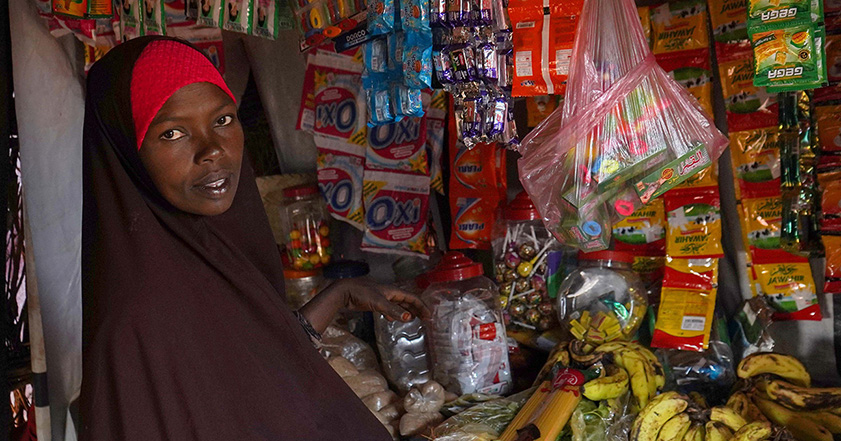When disaster or conflict strikes, women are often some of the worst affected. They are more likely to experience violence at such times, and have higher death rates. In recent events, nearly 1 million women and girls have been displaced within Gaza. About 90% of people fleeing Sudan into Chad are women. But while caught up in unimaginable circumstances, women are making difficult and courageous choices to keep their families safe.
In this blog we’re featuring the stories of 7 women ShelterBox have supported. They share what they have faced, and the challenges they have overcome. This International Women’s Day let’s reflect on the brave women facing displacement with courage, perseverance and hope.
Nurta, Somalia
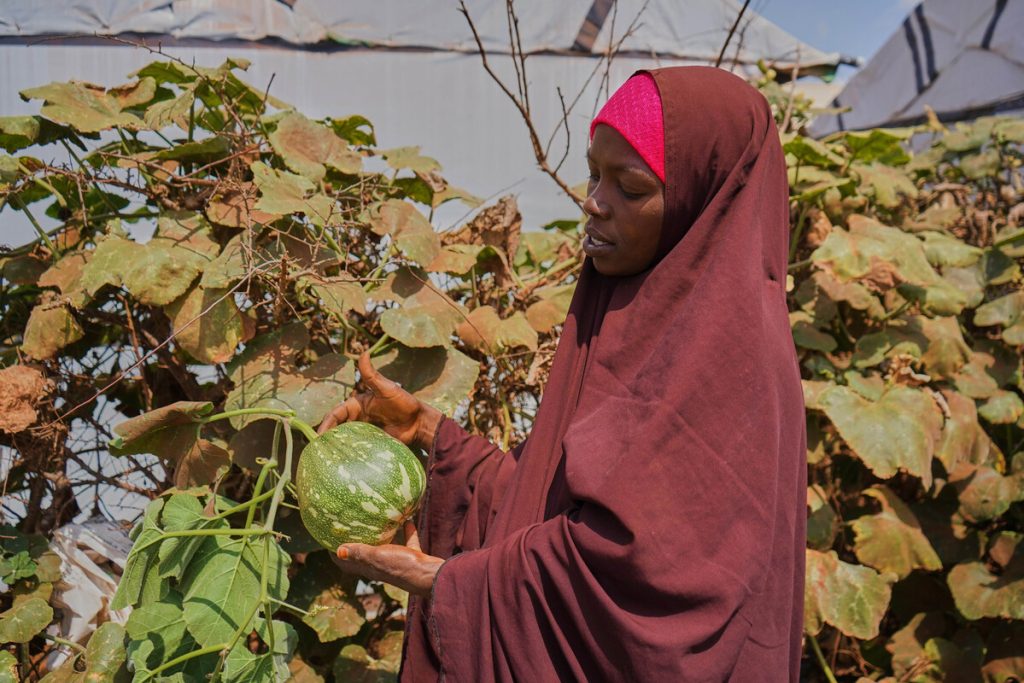
Nurta, a 30-year-old mother of seven, was once a pillar of her community. Her daily life in Somalia was dedicated to tending to livestock and cultivated crops. However a severe drought drastically altered the once diverse landscape and rich soil. Their farmland was destroyed.
Nurta explains, “My upbringing involved tending to goats and cows, a lifestyle that has since vanished due to the impact of the drought. In the past, I owned land, a residence, and a functioning farm where we would cultivate crops and harvest them in due time. We would also sell surplus maize or sorghum in the market to acquire other essential items. However, the prolonged drought caused us to lose our livestock. Our lives drastically changed, transitioning from a state of relative comfort to one marked by famine.”
As a result of the drought the family had to leave their home. The journey to safety for Nurta and her children was full of challenges. They grappled with uncertainty, hunger and thirst. Traveling for eight days, by foot and by car, they eventually arrived in Baidoa. When they first arrived, the family lived in a makeshift shelter. They then received a tent and household items from ShelterBox and Juba Foundation. We also secured Nurta the right to remain where she had settled for five years.
With this security, Nurta was determined to secure her family’s future. “I have a small shop at home where I sell sweets, vegetables and other small daily essentials to our neighbours. Due to the [ShelterBox] support, I can now focus on my small business I started inside my house.” Opening this small business has bought Nurta both material and emotional resilience. While earning money she has nurtured connections and friendships within her new community. She has also returned to her farming roots, growing pumpkin plants next to her shelter.
“Presently, my husband, an elderly man, is unable to work, making me the sole provider for our family. Our children had to abandon their studies and formal education. The path ahead is uncertain, especially in terms of ensuring a quality education and future for my children. Providing for their education and other needs is a constant concern, given our limited resources.”
Despite the difficulties though, Nurta remains focussed on the future of her children. “I remain determined to secure a brighter future for my family despite the challenges we face.”
Apsatu, Cameroon
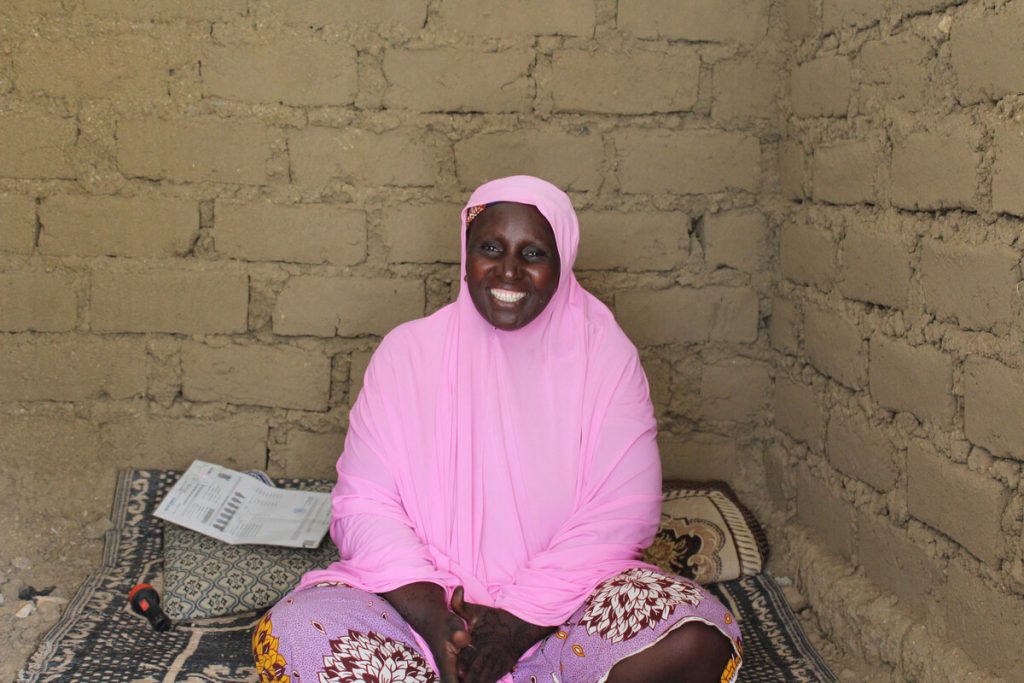
Apsatu had a peaceful life in Nigeria, where she was devoted to making her family happy. She lived in a pretty, well-built house. With her husband’s support she did business trading food, textiles, fishing and farming. And then in one night, it was all gone. The violent militant group Boko Haram attacked her village.
It was a peaceful morning when Apsatu heard the gunshots signalling the arrival of Boko Haram. “It took me a few minutes to pull myself together and think about what to do. I left my house through the back, trying to gather my family, my young children. I was afraid for my husband and sons. The men were usually killed or taken away by force, and I didn’t want that for them. As I feared, they entered the houses, killed the old men and took away the young girls and boys. I ran with my children, not knowing where I was going; I could hear the heart-rending screams and perverse laughter of our assailants behind me, but I didn’t look back. I never saw my husband or eldest sons again. They were kidnapped and I’m sure that if they were asked to kill me today, they would because they’ve been brainwashed.”
Fleeing into the forest, Apsatu was only with her two young daughters. Fortunately some of her other children had survived the attack. Apsatu was able to meet up with them a fortnight later. She then tried to lead her children to safety. But they were forced to move multiple times due to Boko Haram attacks. Eventually, the family reached Minawao Camp in Cameroon.
“I hesitated for a long time about settling in Minawao, but I realised this was the place where my safety and that of my children would be guaranteed. Since I’ve been here, I’m no longer afraid to sleep at night, or to see my children outside. Living conditions have improved over time, and today I have integrated perfectly into the camp. This constant fear has prevented my children from having a normal life and going to school on a regular basis. They are traumatised by having had so many bad experiences. That’s why I don’t plan to leave here anymore, I’ll try to improve my daily life so that we can feel comfortable here.”
To support their life in camp, Apsatu has set up a small stall selling essentials. She also received support from ShelterBox and Public Concern to create a semi-durable shelter. This is better able to withstand the harsh climate. She is proud to have added touches that make her shelter unique. “The cement, the gate, and the shed make my house different from the others. My short-term goal is to find a rope that I can use to reinforce the roof, find cement to plaster the inside walls, and one day replace the tarpaulin roof with a sheet metal one.”
Now settled in Minawao camp, Apsatu looks ahead to a better future for her children.
Tatiana, Ukraine
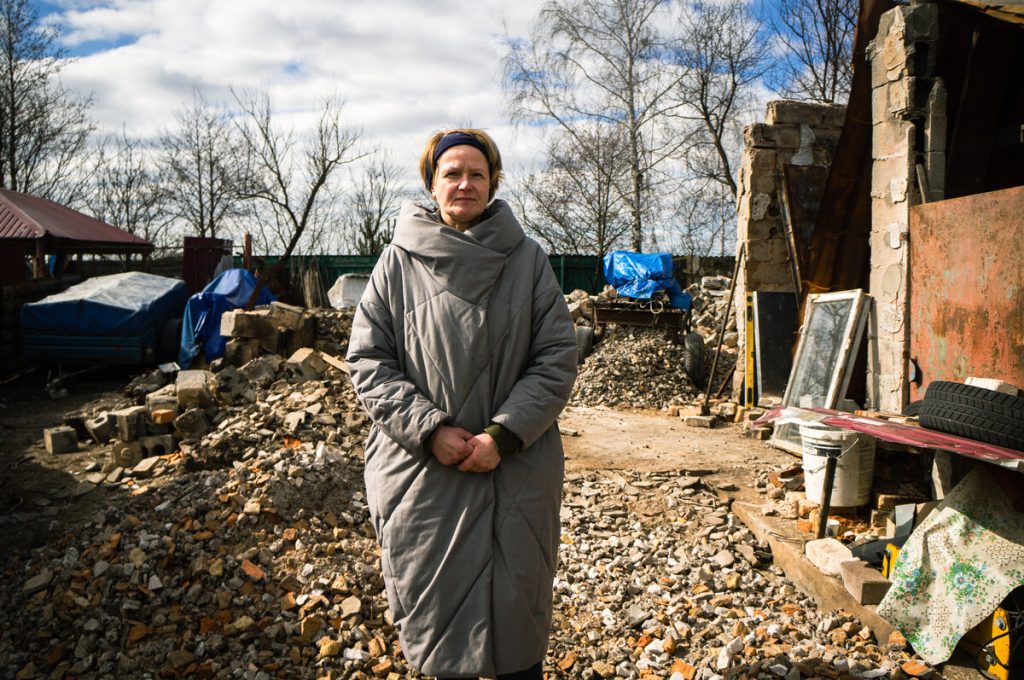
Tatiana is one of millions of people who have had their lives turned upside down by the conflict in Ukraine. She worked as a psychologist, while her husband was self-employed. She remembers their house fondly.
“We had a two-storey house. On the ground floor there was a sauna, dining room, guest bedroom. On the second floor was our bedroom and two more rooms that we prepared for children we wanted to take into care or adopt.”
Their home was destroyed in the conflict, and Tatiana was living in their garage as a result. Losing her home and the constant air raids have taken their toll. “It was difficult for us emotionally and psychologically.”
“During the shelling, we were afraid that our garage would be destroyed and now it’s scary when there are air alerts and I want to cover everything I have left with my own hands. Because we will have nowhere else to go. I want to hug everything and protect it, every time the air raid alarm sounds I get scared.”
Hearing drones is also petrifying. “I’m cleaning the house and I think it’s going to end now. I am so scared when the drones fly. It’s hard for me to handle it, even though I’m dealing with it myself, I’m a human being, I’m a human being at home.”
Another threat to those without shelter in Ukraine are the bitterly cold winters. Tatiana was very grateful for the stove she received from ShelterBox and Reliefaid. “It was very helpful, because there was no electricity, and the house needed to be heated. The house would have collapsed, and we needed heat. We would not have survived without it. Every time we fired up the stove, we thought of you. You helped us so much.”
Despite the trauma she has been through, Tatiana is now looking ahead to survival. “It’s been a year since our house was destroyed. we’re getting over it a little bit. I want to thank you for the stove, it has been very useful to us and will be useful again, because we will not rebuild our home in six-months, that’s for sure.”
Shamal, Pakistan
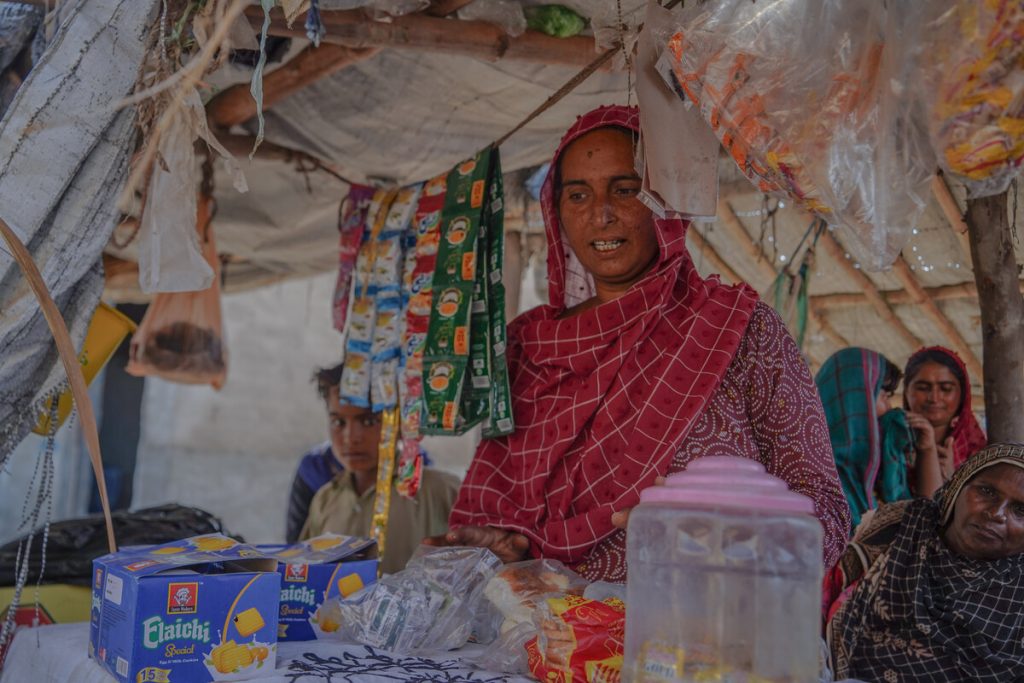
Shamal and her family of five children lost everything in the Pakistan floods of 2022. Their home and livelihood were washed away. After finding their home destroyed, the family lived in a temporary shelter for a year.
The shelter was not adequate protection from the Pakistan climate. Shamal started a small business to try to earn money and support her family.
“It was very difficult for us to live in a shelter that is just there to protect us from the scorching sun but with a little high wind it will be destroyed. I started a small tuck shop with all the money that I had, just so I could provide food for my children.”
It was some time before the family received any help. “Many people came, wrote down our names for giving us aid but never came back. ShelterBox and Islamic Relief came to us, assured us to provide aid and now we look at what they have done for us, we cannot thank them enough, we have a home again, we don’t have to sleep this winter under the open sky. My children are protected, and they have nothing to fear now, I can work and earn some money, our biggest issue has been resolved.”
Shamal and her family received a durable shelter from ShelterBox and Islamic Relief. This community led approach trained people to construct and maintain their shelters.
Protected from the threat of further floods, Shamal can now focus on her business, and looking after her children.
Racia, Mozambique
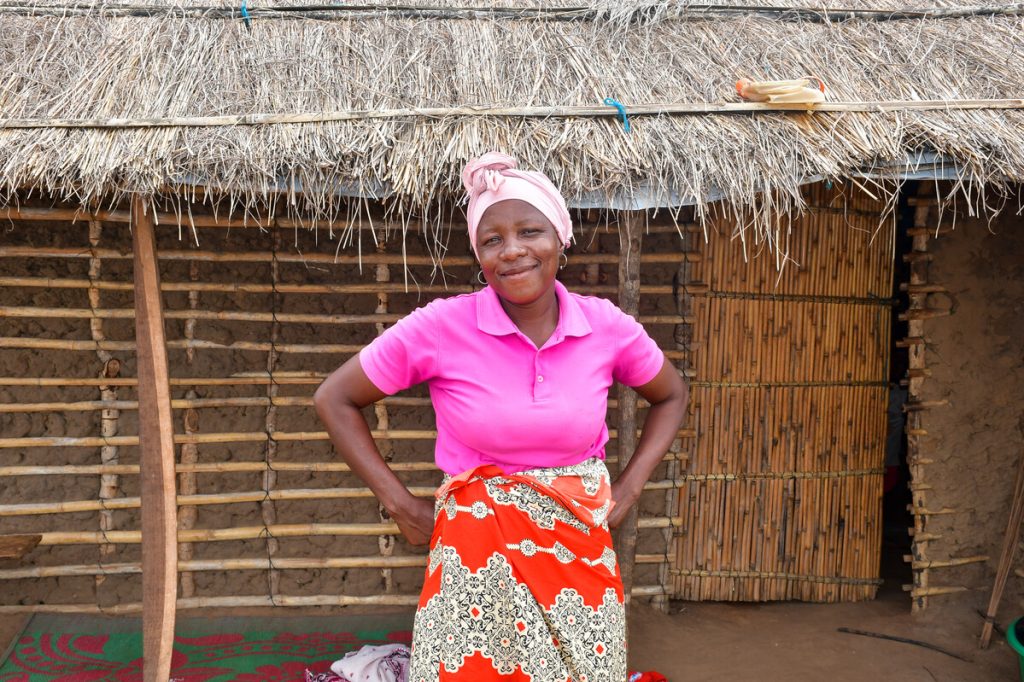
Racia and her family lived a happy life farming, with her children going to school. This was all taken away when Cyclone Kenneth struck Mozambique. Then, just as they were recovering from this, insurgents attacked. Racia remembers the day the insurgents came.
“We heard that the insurgents were close when they entered a nearby village. We were very worried. Around 4 pm, when we were in the field, we started to see smoke. Then we started seeing many people from the other communities coming to the main village. All this happened in rainy weather, and it made it difficult for people to move around.”
“Those in the field tried to return home and rescue the children, but most people could not run with the children. By 5pm, the insurgents had already invaded the village. The insurgents started burning all infrastructure in the village… From 5pm until 8pm the insurgents were firing non-stop. The firing did not stop until after 9pm.”
Racia fled into the bush with her children. Later she summoned the courage to return home and see what could be salvaged. But there was nothing left. A long journey took the family to Cabo Delgado. Racia had nothing with her except her children.
Life in the camp at Cabo Delgado was difficult after the happy life Racia and her family had known. Her children were affected by the trauma they had experienced. “Children play normally, but sometimes they are affected by malaria. Sometimes when children hear sounds like gunshots, they come running thinking it is the insurgents.”
“Here I don’t have the same comfort that I had at home. At home, I had a television, my children watched and enjoyed themselves. I would like to have all this here too. I would like to have a mattress, electricity and a telephone.”
Racia received shelter and household items from ShelterBox and CARE Mozambique. This allowed her to cook for herself and her family. She also improved their shelter. Racia now does some farming, as well as caring for her family. She looks ahead to a time when she can lead her family home.
“I would like to return home and live without any fear or worry.”
Samira, Ethiopia
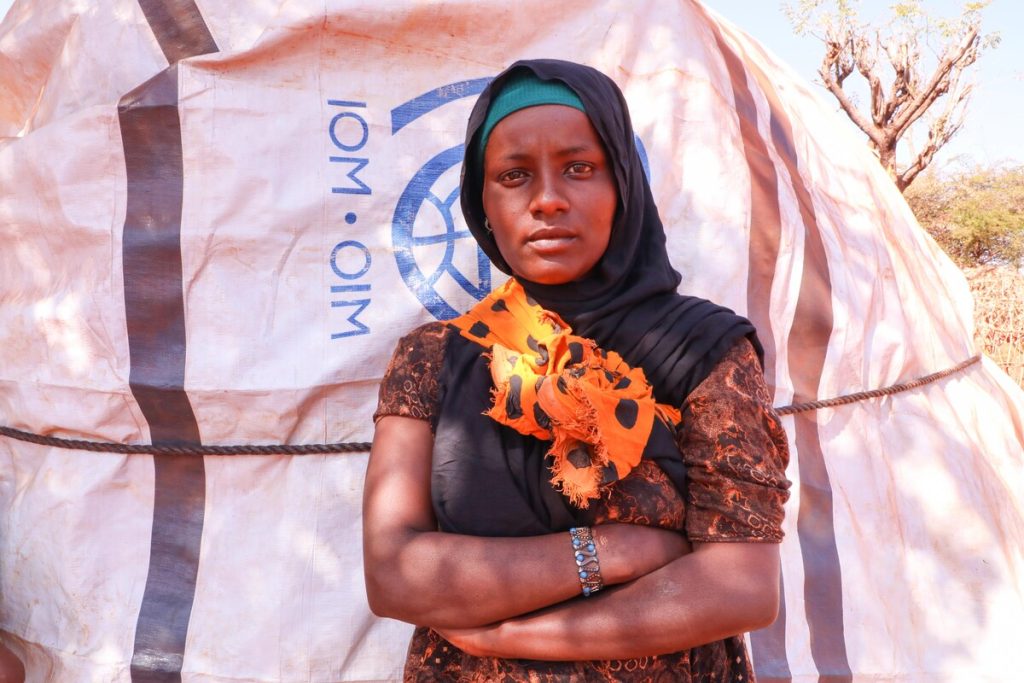
As the climate crisis worsens, extreme weather events such as droughts are predicted to become more common. More people are expected to be forced from their homes as a result. One person who has already lost their home due to drought is Samira.
Samira previously had a good life. The family owned livestock and farmland. However as severe drought conditions in Ethiopia put pressure on resources, violent conflict erupted. Samira and her family were forced to flee. The journey they faced to the displacement camp was arduous. “When traveling on the road, we faced problems such as thirst and hunger.”
“This is the first time I have been displaced. Sometimes it’s difficult to adapt to the weather conditions. It’s difficult to protect my family as I have nothing.”
Samira received from ShelterBox and IOM a mixture of shelter and household items. She can now collect water for her family, and use the tarpaulins to protect them from the harsh sun.
Despite the challenges she has faced, Samira is now trying to earn money by selling wood she collects. She also has long term plans for her family. “I am hoping to have/build a permanent house.”
Marie, Burkina Faso
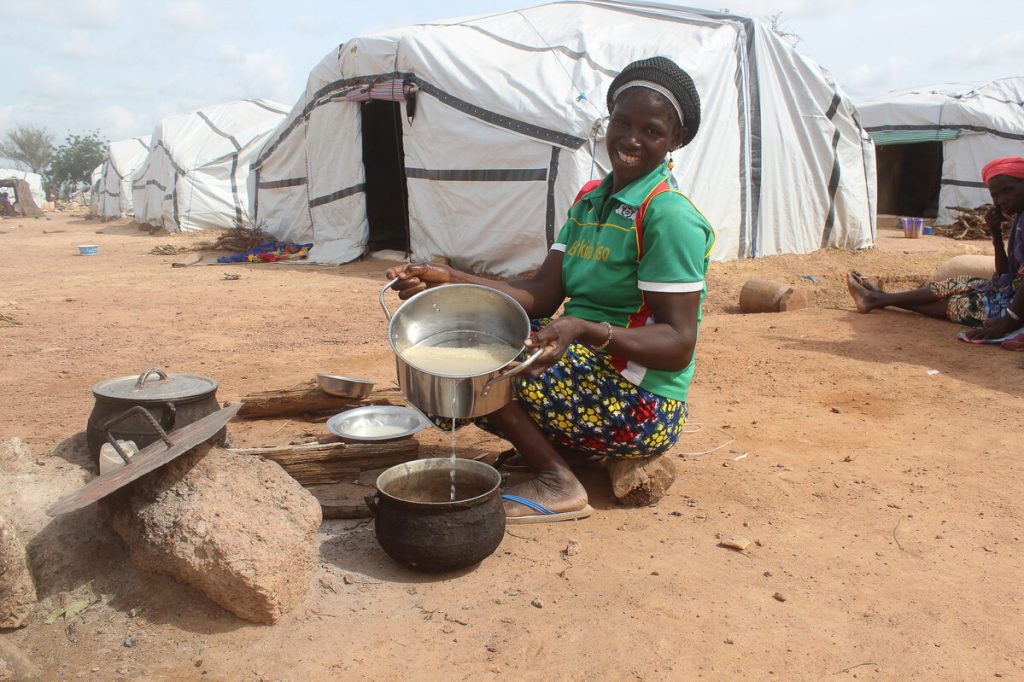
Marie and her family were forced to flee their home in Burkina Faso due to violent attacks. They are just a few of the millions of people who have had to do so.
The family had a good way of life before the conflict began. “Before the conflict, we lived well. Our house was in good condition, made of banco [a building material, consisting of mud, water and other organic materials].”
Increasing levels of violence meant that the family could no longer stay. Marie led her children away in the night. They had no possessions but Marie was grateful for the safety of her family. “When we fled, we could not take our carts, motorbikes or belongings. We walked on foot and were only concerned about the safety of our children; losing of the material, it was no longer a problem.”
The family now live in a resettlement camp. Marie received a Sahelian tent and household items from ShelterBox and HELP. Sahelian tents are made from local materials and are more durable in the local climate. Marie was very happy with the items she received, and started using them right away to help her family.
“Of all the things we received, the [Sahelian tent] was the most useful, followed by the covers. We are no longer worried about the coming rain due to the new shelter as we are well protected.”
“Mosquito nets have also helped us a lot because if you don’t have one, you risk of developing malaria from mosquito bites. There are the dishes too. Everything we received was very useful.”
“Truly, we were very happy [with these aid items] because the lack of shelter and household items was a real concern for us. We were relieved.”
These 7 women are just some of the many people we have supported. We are very grateful that they shared their stories. They highlight some of the challenges that women who are displaced face, and overcome. Discover more stories on our Impact page.
To support people facing disaster or conflict without shelter, please donate now.

